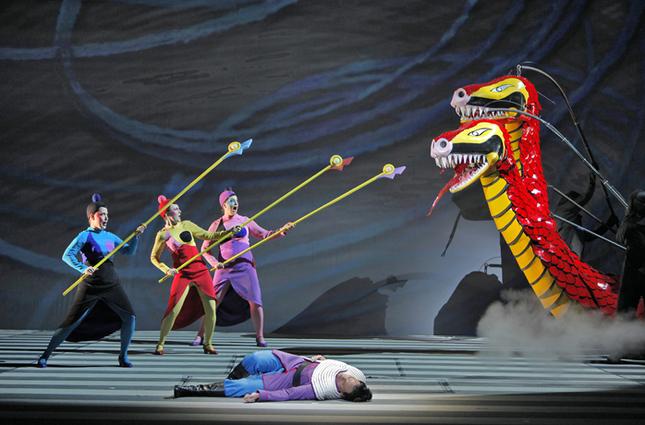Soloman Howard’s Wizardry in WNO’s ‘Magic Flute’
By • May 2, 2014 0 1512

Here’s a hot tip: “The Magic Flute” is coming.
Mozart’s last opera was a big hit at its 1791 premiere at the Freihaus-Theater auf der Wieden in Vienna, where it ran for an unheard-of 100 performances, though Mozart himself did not live to see that milestone.
It’s been a hugely popular opera ever since, with the whole-family appeal of its stirring fairy-tale story: a brave prince named Tamino, with the help of the Queen of the Night, attempts to rescue her daughter, Pamina, from the evil sorcerer Sarastro. Magic stuff indeed. It’s cliff-hanging adventure, fantasy, comedy and romance tonight, with the musical gifts of Mozart on display in full force.
So the news that Washington National Opera will be staging “The Magic Flute” would perhaps not be big news ordinarily. But the WNO production of “The Magic Flute,” which runs May 3-18, is no ordinary project or production.
Perhaps most importantly, this production of “The Magic Flute” will be sung in English, in line with Artistic Director Francesca Zambello’s initiative to broaden the WNO’s audience base. It’s a boon for fresh audiences and a challenge for singers, and it adds a new dimension to the opera, usually sung in German.
That especially concerns bass Soloman Howard, the Washington-born-and-raised bass who sings the part of Sarastro.
“It’s a part I’ve always wanted to do,” he said. “Singing in English is a challenge, and it’s the kind I like to face, but having the opera done in English, well, it’s a step that should bring in people who don’t normally go to the opera, or find it too intimidating. It makes things accessible, and this opera as a story, and a look and design, is already something everyone can embrace. Kelley Rourke, our dramaturg, did this new version in English, and she works with all of us singers. You have to find how to stretch or not different vowels, how low or high you can go with a word, a feeling in English, as opposed to German.”
Soloman is in his third and last year in the WNO’s Domingo-Cafritz Young Artist Program. In June, he will appear in the world premiere of “An American Soldier,” composed by Huang Ruo with a libretto by playwright David Henry Hwang, the season-ending American Opera Initiative production.
The biggest news is that he has signed a contract with the Metropolitan Opera Company to sing the part of The King in their fall production of “Aida.”
“I’ve been very fortunate, and it’s a great honor to get something like that,” he said. “But I’ve grown here, being able to perform here, getting out into the community, working with children in the area where I grew up. I’m going to miss it – the company, the director, all the people you work with. It’s like a family.”
Soloman, who has a phenomenal lower range that appears to come straight out of the ocean floor, has made big impressions and big strides here. He got to sing “Old Man River” in Zambello’s production of “Showboat,” he was a stirring and moving Muhammad Ali in the powerful “Approaching Ali” produced for the WNO’s new commissioning program for contemporary opera and he was a roaring lion in the wonderful WNO children’s production, “The Lion, the Unicorn and Me.”
“To me, seeing kids and going to the schools here is a way to make a difference. They see me, and they maybe recognize there’s all sorts of avenues out there,” he said. When we talked with him about Ali, he recalled his own growing up going to high school in Suitland, Md. “People wondered about why I was doing classical music. They’d say, Why aren’t you doing pop, or gospel or blues? Well, I can do that, I suppose. But the challenge is what’s important.”
Solomon is joined in the youthful “Magic Flute” cast by newcomers to the WNO Maureen McKay and Eri Nakamura as Pamina, Kathryn Lewek and Anna Siminska as the Queen of the Night, Joseph Kaiser and Paul Appleby as Tamino, Joshua Hopkins and David Pershall as Papageno, Jordan Bisch as Sarastro, John Easterlin as Monostatos and Ashley Emerson as Papagena.
WNO Music Director Philippe Auguin will direct the WNO orchestra and Harry Silverstein, who directed a popular “Marriage of Figaro” here, is directing the production.
Of particular interest are the costumes and sets designed by the brilliant Japanese-American set and costume designer Jun Kaneko, who has created a unique, high-tech look and environment that includes the use of projections. There will also be a special exhibition of his artwork in the Hall of Nations through May 19.
Opening night of “The Magic Flute” on May 3 will be part of the WNO’s popular and popularizing “Opera in the Outfield” program, in which the opera is broadcast live to the high-definition NatsHD scoreboard at Nationals Park beginning at 7 p.m. Admission is free and the gates open at 5 p.m.
As part of the ballpark program, there will be pre-game entertainment in the form of Taiko drumming, a meet-and-greet with Ms. Brown (“Chief Chocolate Officer” of M&Ms), photo ops with the living statue of Babe Ruth, cutouts of characters from “The Magic Flute” and a costume trunk.
On May 5, there will be a free preview performance of musical highlights from “The Magic Flute” at the Kennedy Center’s Millennium Stage, performed by members of the Domingo-Cafritz Young Artist Program and other artists from the production.
In addition, there will be pre-performance education events called Opera Insights prior to every performance in the Opera House.
Performances for “The Magic Flute” are May 3 and 5 at 6 p.m., May 7 at 6:30 p.m., May 8 at 6:15 p.m., May 10 at 6 p.m., May 11 at 1 p.m., May 15 at 6:30 p.m, May 16 at 6:30 p.m., May 17 at 6 p.m. and May 18 at 1 p.m.

